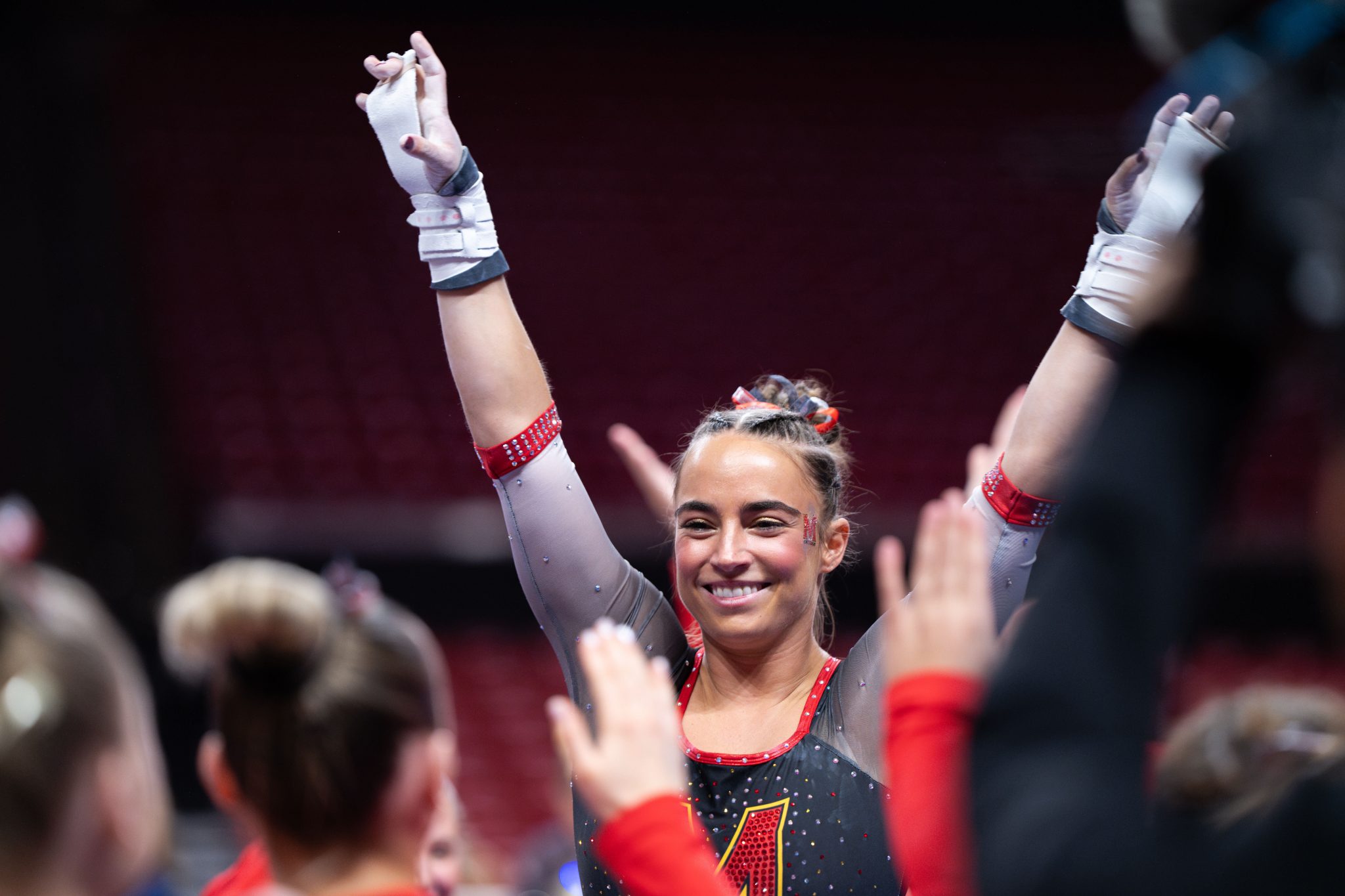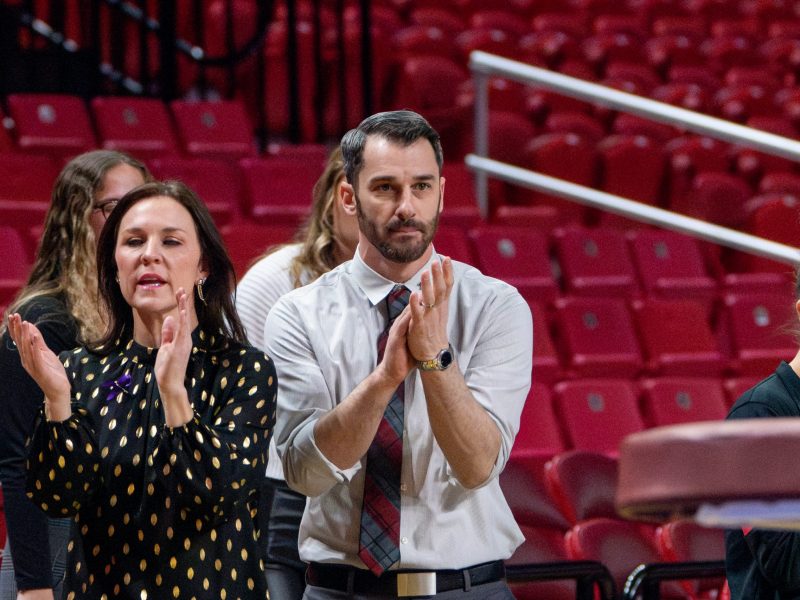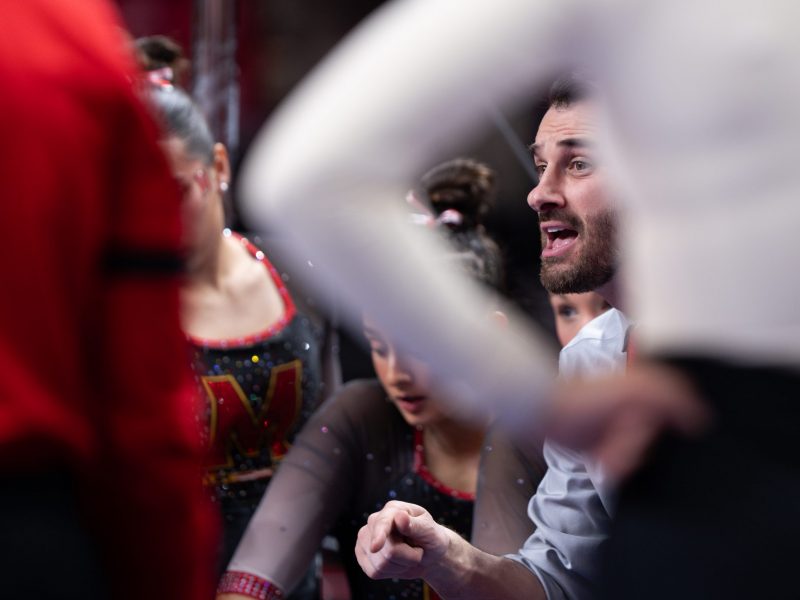The last time a Maryland gymnast competed at the NCAA championships was April 21, 2001. That was five days before the Terps’ newest qualifier, fifth-year Emma Silberman, was born.
Silberman will compete for the vault national title in Fort Worth, Texas, on Thursday. She is the first Terp to do so since Jill Fisher and Gillian Cote competed 23 years ago.
“There’s no words to really describe how I feel,” Silberman said. “I’m just so honored that my coaches get to experience something like this and all the hard work from me and my team. It’s really gonna show off in the end.”
When Maryland competed in the first round of the NCAA tournament at the Gainesville Regional in early April, it entered its final rotation, vault, in third place and in a desperate push for a score. Midway through the lineup, Silberman sprinted down the vault runway in what appeared to be her final collegiate routine.
The Pennsylvania native jumped onto the springboard and twisted around to face forward onto the table. She twisted half way once again to perform a back pike, sticking her landing onto the mats.
Silberman saluted the judges with a bright smile. She earned a career-high 9.950.
The fifth-year knew she had a stellar vault upon landing. But she didn’t realize it secured her a spot in the national championship.
[Maryland gymnastics ends season with a 196.350 and a third-place finish at NCAA regionals]
“It was one of the craziest minute and 30 seconds of my entire life,” Silberman said. “I wasn’t expecting a score like that. All the coaches congratulated me on a great career and then the score flashed and I was super excited. I was almost in shock.”
After regionals, coach Brett Nelligan said he and Silberman saw humor in her story of reaching the championship. Both admitted vault was one of Silberman’s weakest events before joining the Terps.
Silberman competed a standard Yurchenko layout in club, but the skill was not difficult enough to get by in Division I. Nelligan and Silberman tried around with new skills the summer before her freshman year and ultimately settled with a full-on tuck-off vault, a 10.0 start value at the time.
She competed the skill during her first two collegiate seasons. But the skill was devalued to a 9.95 start value before her junior campaign.
Silberman learned a similar skill, a full-on pike-off, where gymnasts use the same hand placement on the vault table but form into a piked position rather than a tucked. The skill was, and still is, marked as a 10.0 start value. Only a handful of NCAA gymnasts compete the pike-off, Nelligan said.
Nelligan said training the new skill didn’t bother Silberman, despite its increased difficulty. He said his star was only disappointed for 10 seconds when she learned she needed a new vault skill. Silberman wanted to get back to work with assistant coaches JJ Ferreira and Morgan Epps.
“All credit to her work ethic,” Nelligan said. “Credit to her for taking it in a positive light and running with it. And I think that’s the reason she is where she is now.”
[Maryland gymnastics hopes to carry momentum into NCAA regional]
If their teams don’t compete at nationals, the top individual scorers on each event at regionals can vye for the event’s national title. These individual qualifiers will compete with one another and team vault competitors, meaning Silberman will face 51 other vaulters.
Nationals will close out Silberman’s unique collegiate career.
She walked onto the team before her freshman year and became an all-around competitor by the end of that campaign. An ACL and meniscus tear midway through the season cut her sophomore year short. Silberman’s performances over her next two seasons elevated the Terps’ status in the Big Ten.
Silberman earned second team All-Big Ten, three WCGA Scholastic All-American awards and a Big Ten Co-Gymnast of the Week honor by the end of her first four seasons.
Silberman faced a tough decision at the end of her senior year: end her collegiate career or continue for another season. Now, her choice will culminate in perfect fashion. She described it as “surreal.”
“I’m super proud that I get to experience this and take these chances and talk about it with my team after I get back,” Silberman said.
Ahead of her last collegiate meet, Silberman said a win for both herself and Maryland’s program. The Terps marked their second-highest regionals score in program history in 2024. They were the only Big Ten team that finished in the conference’s bottom half of regular season play to send a gymnast to nationals.
Maryland earned a team national qualifying score of 196.710 in 2023. The Terps improved that score to 196.790 a year later — their highest in team history. Nelligan said Silberman’s opportunity at nationals is only a piece in Maryland’s rise to national success.
“The last four or five years, just steady constant progress,” Nelligan said. “Now, a national qualifier, this just fits with our story of being a program that’s on the rise.”
The coach and the star will look to soak in their final moments together as both look to the future. As the duo discussed plans for after Silberman’s routine Thursday, they came to a pause, Nelligan said. He asked her if she wanted to stay through the entire championship weekend, but Silberman was hesitant.
She didn’t want to make her coaches stay the whole weekend. Nelligan encouraged her to soak in the experience.
“Finishing my career at nationals is something I would have never dreamed of,” Silberman said. “Every single piece of adversity that I went through led to where I am today.”



